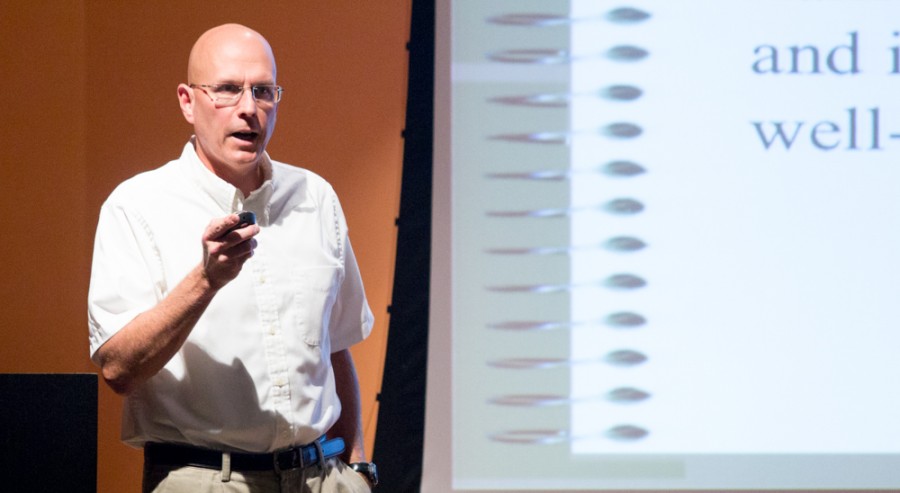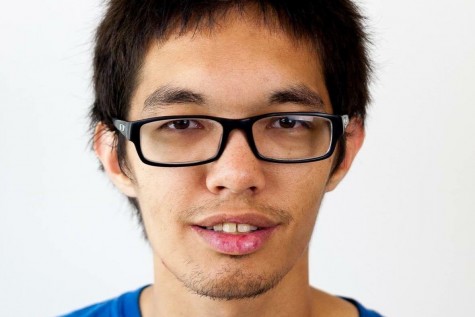NIU professor advocates veganism based on philosophy
Mylan Engel, a philosophy professor from Northern Illinois University, spoke to the EIU Philosphy Club in the Lecture Hall of the Doudna Fine Arts Center on Thursday. Engel’s talk, “Fishy Reasoning and the Ethics of Eating,” centered around the effects of raising animals for human consumption.
October 2, 2014
What Mylan Engel remembers most about his grandfather’s hog farm is when he was about 8 years old and he first saw piglets being castrated.
“It was horrifying,” Engel said. “My cousins were castrating those pigs like they were peeling carrots.”
Engel, a philosophy professor at Northern Illinois University, presented his reasons for following a vegan diet based on ethical principles and health reasons Thursday in the Doudna Fine Arts Center Lecture Hall.
Engel explained his advocacy for veganism by outlining HASK practices, or practices that knowingly harm, inflict suffering on or kill conscious sentient animals “for no good reason.”
He said in situations where no other resources are available, killing animals for food is acceptable, but in most situations, plant-based diets are viable options.
However, Engel did not always follow these guidelines; he himself was a hunter until the age of 20.
While in graduate school in 1984, Engel participated in competitive long distance running with a friend who was vegetarian.
He said he became convinced he could meet all his nutritional needs with a vegetarian diet when he realized his friend was the fittest person he had ever met.
“This guy could run circles around me, so I switched to a vegetarian diet,” Engel said.
Engel did not become vegan until 1996 when he attended the World Congress for Animals in Washington, D.C. and met animal rights leaders.
“Listening to them talk and seeing how healthy and vibrant all these vegans were around me, I realized that the only way I could be consistent with my own values was to give it all up,” Engel said.
Engel defended his premises by citing data that suggested humans’ nutritional needs could be met with a plant-based diet.
According to his presentation, the American Dietetic Association and the Dieticians of Canada share the position that vegetarian diets are healthful, nutritionally adequate and can prevent and treat certain diseases, and well-planned vegan and vegetarian diets are appropriate for all ages.
One audience member asked about individual sustainable farming, citing that there were simple, efficient ways to kill animals that are quick and relatively painless.
Engel responded that killing animals when other options are available is still wrong because it is depriving the animal of half or more of its life.
“If in the middle of the night tonight when you’re sound asleep, I slit your throat and kill you painlessly, would I have harmed you?” Engel asked.
Engel also pointed out that vegan diets offer plenty of variety, contrary to what some might think.
“But this privilege of having a wide variety of choices, it’s ethically constrained,” Engel said. “The privilege stops once there’s a victim.”
Another audience member asked why eating eggs or milk was ethically wrong if those products were not sentient beings.
Engel said 900 million male chicks are grinded alive each year because they are considered byproducts of egg production, and similarly, bull calves are sold for veal and calves in general are taken from their mothers, causing them to grieve.
“We’re led to believe by the dairy council that milk, it’s a natural, it does a body good,” Engel said. “But human beings are the only mammalian species that drinks milk past the age of weaning.”
Another point of his lecture was that eating fish is unethical as well because studies indicate their intelligence and ability to feel pain, whether they are crushed by the weight of other fish in giant nets, suffocated on the surface, destroyed by the rapid changes in pressure, or kept in bad conditions on fish farms.
“Fish typically experience extremely painful deaths at our hands,” he said. “Treating fish in these ways harms them, causes them to suffer and kills them.”
Still, some audience members were not convinced.
Gage Dailey, a freshman communication studies major, said he thought working toward better conditions for farm animals would be a better solution than going vegan.
“The moral issue seems to be what happens before it dies,” Dailey said. “I don’t see how being a vegan stops them from suffering. I think being a vegan is just kind of ignoring the issue of the fact that the animals are suffering.”
Grant Sterling, a philosophy professor, said animal ethics are extremely popular and controversial questions among philosophers.
“I think it’s a serious challenge for people who continue to eat meat, and specifically for those who eat fish, for them to say, ‘OK, well how do you justify it in the face of these arguments?’” Sterling said.
Stephanie Markham can be reached at 581-2812 or [email protected].



















































